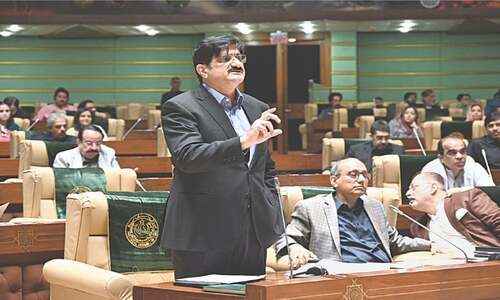
CONTRARY to what is commonly believed, feminism in Urdu literature is not something new. The first traces of feminist views in Urdu can be found as early as in the sixth and seventh decades of the 19th century, as reflected in the writings of Nazeer Ahmed Dehlvi (1830-1912) and Altaf Hussain Hali (1837-1914).
Though not feminist in the strict sense of the word, these writers were concerned about the status of women in the subcontinent’s society. With their reformist thoughts and moralistic views, Nazeer Ahmed’s novels sound too didactic but he had realised the lack of proper educational facilities for the women in his society and the disastrous consequences. The absence of proper textbooks for girl students prompted him to write some books in the shape of novels with which he began teaching his own children. On the other hand, in Hali’s poetry one finds some poems that advocate the rights of women and raising their status in the subcontinent’s society. Before Hali, a woman was depicted in Urdu poetry mostly as sweetheart, but Hali reminded that she can be a mother, sister and daughter, too.
It was, perhaps, Rasheed Jahan who can truly be called Urdu’s first feminist writer and whose feminist views were echoed in the writings of scores of women writers later on, such as Ismat Chughtai, who followed the path. Also, Mirza Azeem Baig Chughtai was one of the earliest writers of Urdu whose views can be termed as feminism. But that was not before the first quarter of the 20th century had passed. And it was Moulvi Mumtaz Ali (1860-1935) who took the real significant step by launching an Urdu magazine Tehzeeb-i-Niswan from Lahore in 1898, exclusively for women. The Aligarh-educated Mumtaz Ali had launched this magazine against the advice of Sir Syed Ahmed Khan (1817-1898) who was not in favour of sending girls to schools or even establishing girls’ schools. Not only did Mumtaz Ali launch the magazine but made his wife, Mohammadi Begum (1878-1908), its editor. She is the first woman to have ever edited an Urdu magazine.
The last decade of the 19th century was a revolutionary one for women’s education in the subcontinent for it saw an acceptance for the idea of women’s education from Aligarh Movement in 1899. After Sir Syed, his son Syed Mahmood and Justice Ameer Ali had convinced Muhammadan Educational Conference for adoption of a motion favouring female education.
This unleashed an era of reformist trend and a kind of ‘reformist feminism’ in the subcontinent as well as in Urdu literature. Although most of the proponents of female education and reforming the societal attitude towards women’s status for their uplift were men, they were, however, not true feminists as they neither fully believed in the equality of the sexes nor did they advocate women’s rights the way modern feminists do today. But these voices were genuinely perturbed by the manner in which women were treated and the way women themselves behaved.
One of the most prominent figures who launched a campaign for women’s rights and their education in the latter half of the 19th and early 20th century was Rashid-ul-Khairi. He blended reformist and didactic teachings with literary works and is considered among the pioneers of Urdu short story along with Munshi Premchand and Sajjad Hyder Yildirim. A novelist, short-story writer, essayist, historian, humorist, poet, translator and journalist, Khairi in his literary works, which he penned in quite a large number, portrayed the lack of education and manners in middle-class Muslim women and its ill effects.
Born Mohammad Abdur Rashid in January 1868 in Delhi, Allama Rashid-ul-Khairi wrote over 90 books and booklets. Ismat, a magazine launched by him in June 1908 from Delhi was exclusively published for women. The magazine stood for women’s education and was soon acknowledged as a supporter of rights of women. Other periodicals that Rashid-ul-Khairi launched for women include Tamaddun, Sahaili, Banaat and Jauher-i-Niswan.
Rashid-ul-Khairi belonged to a noble and literary family. From his ancestors to the present day, many generations of this family have rendered valuable services for the promotion of Urdu language and literature. Abdul Jabbar Khairi and Abdus Sattar Khairi, the famous political and religious activists, too, came from the same family. Dr Dawood Usmani’s book Allama Rashid-ul-Khairi aur un ke khandan ki adabi khidmaat ka tanqeedi jaeza successfully captures the essence of the literary works of this eminent family. It is in fact Usmani’s doctoral dissertation and he has done real hard work to analyse different aspects of Rashid-ul-Khairi’s life and his works. Published by Anjuman Taraqqi-i-Urdu Pakistan, the 528-page book is divided into 10 chapters. Aside from Rashid-u-Khairi’s life and works, the book also takes into account the literary works by the descendants of Rashid-ul-Khairi, which include Raziq-ul-Khairi, Khatoon Akram, Amina Nazli, Sadiq-ul-Khairi, Saad Khairi, Haziq-ul-Khairi, Raziqa Khairi, Saima Khairi, Safoora Khairi, Zaira Khairi and Hina Khairi.
A rich bibliography and an index have added to the value of the work.
Rashid-ul-Khairi died on February 3, 1936, in Delhi.
Published in Dawn, January 29th, 2019

































